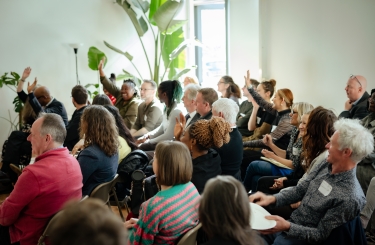Related


As part of our ongoing learning focus on participation, we spoke with Onyinye Nkemdirim, London Regional Manager for Sported, the UK’s largest network of community sports clubs and groups. Sported recently ran a Participatory Grant Model pilot which focused on making funding more accessible to Black-led and Black-centred community organisations.
We spoke with Onyinye about rebuilding trust and how participation and funder collaboration might help funding flow more equitably to communities.
A: It came from a broader question of how we address racism in sport and what our role was in tackling that. We carried out some research on this issue and found that funding within sports is not accessible in the slightest and that it was much more challenging for people of colour to secure funding for sports initiatives, despite them doing so much good work in their communities. Many of them are not necessarily affiliated or connected to any of the larger sports organisations or charities that have the resources to advocate and invest in grassroots groups on a large scale. They’re also often volunteer-led and don’t have a lot of capacity to fundraise.
We felt that addressing access to funding for Black communities and making that process more equitable was one of the key ways we could tackle some of the issues that came up in our research.
We were drawn to participatory grantmaking and the simple idea that those affected by an issue should be part of the decision-making process and we felt this could be a way of building trust within these communities
To implement this pilot, we used existing funds from previous projects and sought additional support from funders who we knew shared this commitment to support community groups, including Greater London Authority (GLA). We also spoke to Sport England who had given us an allocation of funding through the Together Fund, which was quite a large and general fund. We already knew from speaking to community groups in our network that they felt the funding wasn’t being distributed equitably so we reallocated some of this funding to run a PGM pilot with Black-led groups. The London Marathon Foundation also came on board which meant we had several different funding partners who wanted to take that step towards addressing systemic inequalities in sports funding.
A: Yes, even when there is funding available, a lot of people won’t see it as a viable option because of past experiences or because they know someone who’s not had a positive experience with trying to access funding. And it’s not about being unsuccessful on one occasion, sometimes it’s the fact that they’re unsuccessful multiple times and are not being given feedback or support on where they can improve.
With grantmaking in sport, it’s often viewed across smaller organisations that funding is given to the same types of groups. So, when smaller organisations see that happening, it pulls some of that trust away and people feel like they’re not a priority for these funders and their work is not seen as important. And those processes reflect some of the experiences in their personal life as well, so it’s very hard having those same experiences of rejection and not having equal access reflected in the thing you love doing and the thing you are volunteering your time to.
A: One of the things that was important to us was building participation and accessibility into every step of the process.
The fund was delivered through a collaborative panel of individuals who had a specific understanding and lived experience of working in and with Black communities. We had three panels who collectively shaped the format of the fund, created application assessment criteria, developed evaluation and learning outcomes and made decisions on grants to Black-led and Black-centred community organisations.
It was very important for us to be transparent about the whole process from start to finish with the applicants including letting them know who would be assessing their application and on which criteria. We also made it clear to applicants that they would be assessed on their ideas and impact, not who is best at writing a funding application. That meant they could submit applications via video, voice note and in some cases, hand-written applications if they preferred.
We told applicants that we want to judge you on your idea and impact, not on how you best write an application
A: Everyone was very much on board with the idea of the pilot which helped the funders involved be more open to taking risks and trialling innovative approaches to target specific communities. We had actually expected partners to be more combative, but everyone was really committed to making this work. Our initial approach was to reach out to funders with a project plan and asking them to add to the pot. We also had one funder coming on board later so we could give out more grants than expected, which was amazing.
Everyone was committed to getting as much learning out of the process as possible so that each individual funder could take that back to their organisation
The act of giving out the money was almost secondary to doing it – it was all about what processes we could use to make funding flow to Black-led organisations and what we could learn from that and build on going forward.
A: Perhaps the biggest lesson was around time – to make it worthwhile, it takes a lot of time to get everything right, from getting buy-in from different funders and communities to building in time for learning and trust.
Because these communities have not regularly been given access to more traditional grant making processes or are not as well connected in that space, we also found there was a gap between what we thought they would know in terms of grant making and what they actually knew.
It’s also important to recognise that one pilot alone cannot tackle the issues of racism in sport or provide long-lasting impact for communities who have experienced years of inequitable access to resources. Continued engagement and empowerment of the community is key. Without this, the trust built over this PGM pilot will be lost. We need sustained engagement in this model through further rounds of funding – this will also help increase trust among the wider Black community as more groups apply for funding.

